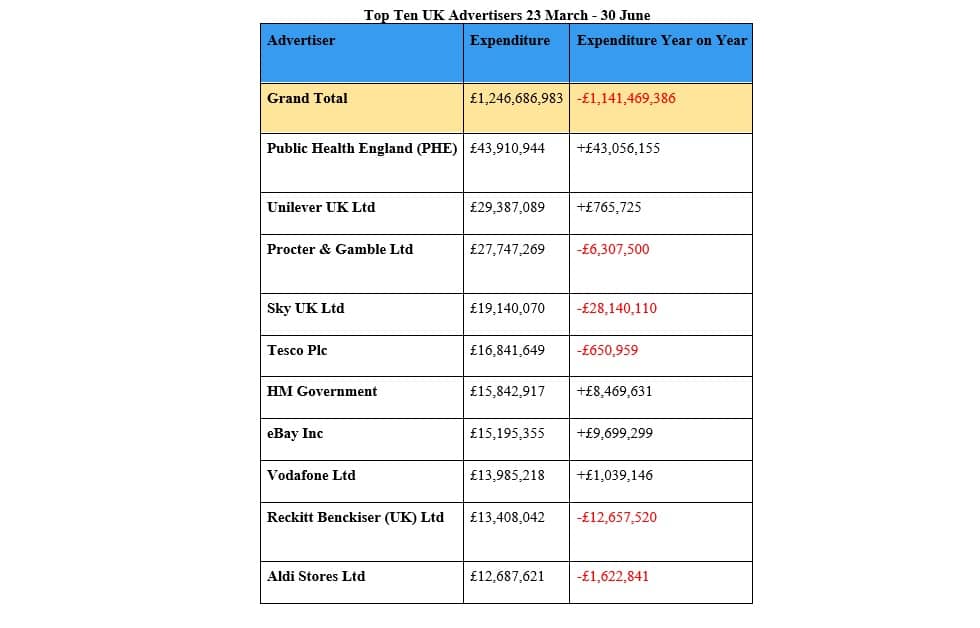
Public Health England was the UK’s biggest spender in traditional advertising during the lockdown period, reveals Nielsen AdIntel data released today. Unilever takes second place, spending £29.4m, followed by Procter & Gamble at £27.7m.
Key findings:
- There was a 48% decline in traditional ad spend across the lockdown period – a drop of more than £1.1billion
- Public Health England became the nation’s biggest advertising spender
- McDonald’s had the biggest reduction in YoY advertising spend (-97%), followed by Sky (-60%) and Amazon (-77%).
Overall, the UK’s lockdown period saw a huge drop in advertising, as lifestyle restrictions and budget concerns led to a 48% drop in spend across cinema, out of home (OOH), press, radio and TV, representing more than £1.1 billion.
McDonald’s had the biggest reduction in YoY advertising spend (-97%), followed by Sky (-60%) and Amazon (-77%). OOH advertising was significantly hit, as advertisers cut spend in response to lockdown and as high footfall areas became deserted.
Although spend on OOH almost doubled from £14m in May to £25m in June as restrictions eased, this was still well below normal levels.
However, some advertisers increased spend during this period. The government significantly upped spend, primarily through Public Health England which saw a year-on-year increase of over 5,000%, as public health campaigns to help control the virus were quickly rolled out across multiple channels. The government spent a further £15.8m on advertising, representing a 115% increase year-on-year. Other advertisers that increased their ad spend included eBay (+176%), Walt Disney for Disney+ (+962%), O2 (+65%) and Microsoft (+142%), reflecting the ongoing relevance of their offerings during this period.
Some categories such as cosmetics and personal care, saw big fluctuations in ad spend as Procter & Gamble cut spend by £9.9m while competitor Unilever increased spend by £3.5m. Online retail brands spent 19.8% more on advertising overall as consumers ordered from home, but Amazon had the third biggest decline in ad spend with a £22m fall compared to the same period last year. Meanwhile, the categories which represented the largest cuts in ad spend were entertainment and leisure (-£207m) and travel and transport (-£138m) with both industries suffering immediate revenue loss due to lockdown restrictions.

Barney Farmer, UK Commercial Director at Nielsen said: “There was no guidebook on how to navigate advertising during the lockdown period, with customers restricted to home environments and an unclear exit strategy. As a result, we have seen varying approaches to advertising, with some increasing spend while the majority cut back.
“Public Health England ran an effective campaign to encourage lockdown compliance and raise awareness of best health practices, and its incredible increase in spend reflects the importance of advertising as a communication platform for any public or private body. As we transition into a less restricted environment, we expect spend to pick up significantly as brands vie to be front of mind.”
